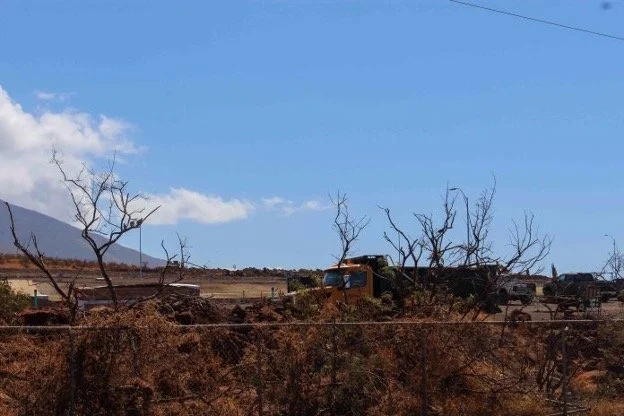Filipina Lahaina Fire Survivors Sold Sex to Survive–New Study
/Reposted from AsAmNews: https://asamnews.com/2025/06/03/tagnawa-report-highlights-need-for-feminist-wildfire-recoveries/
Debris removal on Fleming Rd. in Lahaina after the fires. A new report shows that for Filipino women, fire recovery comes with unique challenges. (Photo by Yiming Fu)
In Tagnawa’s survey of 70 Filipino women, 1 in 6 reported survival sex to have a place to stay, food, or money.
“We don’t want to demonize these women and paint them as doing something wrong,” study co-author Nadine Ortega said. “They were in a really bad situation after the fire. This reveals a little bit about the gaps in recovery and the failures to center women in disaster recovery.”
More than half of the women surveyed also reported feeling unsafe in their shelters post-fire, and one in four said their caregiving duties made it harder for them to go back to work and access resources after the fires.
Tagnawa also found gender-based violence increased after the Lahaina fires. The Maui Domestic Violence hotline received double the monthly calls in the months after the fire. The Maui Sex Assault center also experienced a rise in calls for sexual abuse and forensic interviews.
Lahaina’s Filipino women face challenges from multiple types of oppression, Ortega said. They’re immigrants, they’re women, they’re working class and many have unstable housing situations more than a year after the fires.
“Women are in a precarious situation and it’s like they almost have no choice but to engage in survival sex.”
An invisible issue
Lahaina resident Jordan Ruidas said women take on the bulk of long-term fire recovery needs. While men immediately set up hubs to distribute resources, a lot of the women were at home taking care of the kids and doing paperwork.
Many women cope by making themselves numb, an anonymous source quoted in the study said. They’re often in survival mode, making sure their husbands are well enough to go to work, their children are taken care of, and their family has a place to live.
“A lot of the logistical stress falls on the mom,” the source said. “I hear moms say, ‘I’m afraid to shed a tear because it’s never going to stop.’” Another anonymous source quoted in the study said the struggles are not only because of gender but race.
One in four people in Hawaii are Filipino. Beginning in the early 1900’s, sugarcane plantation owners from the continental United States brought Filipino workers to Hawaii.
As sugar became unprofitable, those landowners transitioned the economy from sugar to tourism. Filipino workers in the fields became the workforce for the hotels.
As a Filipino woman from Hawaii, study co-author Khara Jabola-Carolus said Filipino women and gender oppressed people are marginalized even within their own communities. They know these issues from personal experience. But people don’t talk about it.
Jabola-Carolus said writing the report “was like trying to scream politely.”
“How do you professionally and scientifically write about so much pain in our community and unearth something that even our community is so uncomfortable talking about?” Jabola-Carolus said.
Researchers hope that the study can spark future studies from larger organizations that follow gender-based violence data 5-10 years after the fires.
Recovery recommendations
The Department of Homeland Security used Tagnawa’s report in a news release. They criticized the Biden administration for neglecting American women in the recovery and using FEMA “like a piggy bank, spending hundreds of millions of American taxpayer dollars on housing illegal immigrants.”
Ortega denounced the DHS report as a harmful misinterpretation of Tagnawa’s report. She said Tagnawa advocates for more FEMA funding and reform to support American fire survivors.
“We call on President Trump to issue an executive order to address the crisis of increased violence against women in the wake of the Lahaina fire and allocate federal funds to the recommendations in our report,” Jabola-Carolus said. “We call on DHS to support the report’s call to fund FEMA so that the improvements can be made.”
Tagnawa’s study recommends FEMA revises its weekly check-in practice to include all adult household members. This ensures men, women, and gender minorities have equal opportunities to disclose violence and seek help.
The study also advocates for a joint federal and local gender-violence-fighting headquarters after disasters.
Jabola-Carolus hopes the report will show women’s issues are important to everyone and future fire recoveries need to prioritize women’s issues. The United States lags behind the world in promoting gender equity in its policymaking, Jabola-Carolus said. In the Philippines, every agency is required to dedicate at least 5% of its budget toward gender equality initiatives.
Sexism and misogyny harms everyone by tearing apart the community, Jabola-Carolus said.
In Lahaina, more men died than women in the wildfire. Female fire survivors shared stories that some men chose to “act macho” and stay behind to protect their home in the fire.
The belief in what men and women should act like comes from colonization, Jabola-Carolus said. For example, expressing emotions and caring for family members is not a female trait. It’s a Filipino trait.
“I hope that it’s a call for men to come home to us,” Jabola-Carolus said.” I hope it is a wake-up call that we need feminism for men to heal from wildfires.”
Ortega hopes the study can spark future research from larger organizations that follow gender-based violence data 5-10 years after the fires. Tagnawa’s survey was limited to 70 women, Ortega said, the majority of whom were past child-bearing age. Further, gender-based violence data often takes years to show up.
For Ruidas, the key to Lahaina’s long term recovery lies in women’s strength. She said women are the marathon runners in fire recovery.
“Women are the follow-through people,” Ruidas said. “Women see everything through and bring disaster recovery to the finish line.”
Yiming Fu is a Report for America corps member.



